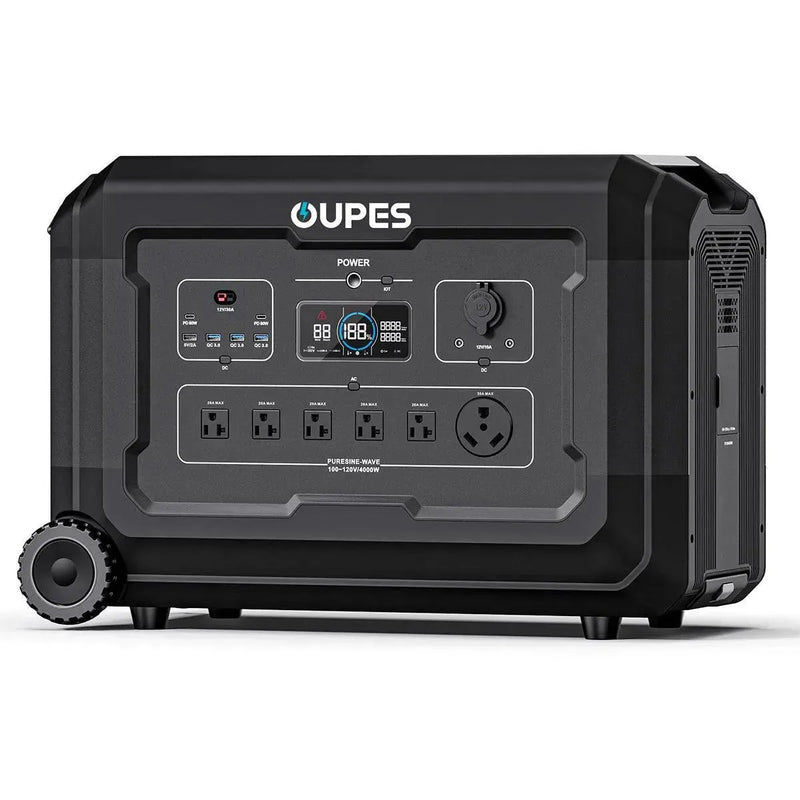
TL;DR / Key Takeaways
- A solar generator combines panels, charge controller, battery, and inverter.
- It stores energy from sunlight for later use, ideal for backup or off-grid living.
- DIY builds are possible but require technical skill; ready-made OUPES systems offer convenience and safety.
- Always size components to match your power needs for efficiency and reliability.
Introduction
Building a solar generator is an exciting project for those who want to harness renewable energy. A solar generator is essentially a system that captures sunlight through panels, stores it in a battery, and converts it into usable electricity through an inverter. While DIY builds are possible, ready-to-use solutions like OUPES solar generators offer convenience, safety, and reliability.
Essential Components of a Solar Generator
- Solar Panels: Capture sunlight and convert it into direct current (DC) electricity.
- Charge Controller: Regulates voltage and prevents battery overcharging.
- Battery: Stores the generated electricity, often lithium iron phosphate (LiFePO4) for durability.
- Inverter: Converts DC electricity into alternating current (AC) for home and appliance use.
- Wiring and Connectors: Ensure safe transmission between components.
Step-by-Step: Building a DIY Solar Generator
- Determine Power Needs: List appliances and calculate wattage requirements.
- Select Battery: Choose capacity based on runtime expectations.
- Pick Solar Panels: Match panel wattage to battery size for efficient charging.
- Add Charge Controller: Ensure proper voltage regulation.
- Install Inverter: Size it to handle peak loads safely.
- Assemble & Test: Connect all components, check voltage flow, and test with appliances.
How to Calculate Power Needs
To size your solar generator correctly, you must calculate energy consumption. Multiply appliance wattage by usage hours to determine watt-hours (Wh).
| Appliance | Average Wattage | Daily Use (Hours) | Daily Consumption (Wh) |
|---|---|---|---|
| Laptop | 60 W | 4 | 240 Wh |
| Mini Fridge | 100 W | 8 | 800 Wh |
| LED Light Bulbs (x4) | 40 W | 5 | 200 Wh |
Adding these values helps you choose a battery with enough capacity to sustain daily loads.
DIY vs. Prebuilt Solar Generators
| Aspect | DIY Solar Generator | Prebuilt Solar Generator (e.g., OUPES) |
|---|---|---|
| Cost | Lower upfront but variable depending on parts | Fixed cost with warranty |
| Complexity | Requires technical knowledge and assembly | Plug-and-play setup |
| Safety | Depends on skill and component quality | Certified and tested for safe use |
| Reliability | May vary with DIY build quality | Consistent performance and long lifespan |
Safety Considerations
When making your own solar generator, safety should be a top priority. Proper fuses, wiring gauges, and ventilation are crucial to avoid overheating or electrical hazards.
Why OUPES Solar Generators Are a Smarter Choice
While DIY solar generators can be educational, OUPES provides prebuilt systems that ensure safety, reliability, and efficiency. With features such as LiFePO4 batteries, multiple charging options, and expandable capacity, OUPES solar generators are ideal for users who want a professional solution without the complexity of assembly.
FAQ
Can I build my own solar generator?
Yes, but it requires technical knowledge of batteries, wiring, and inverters.
How much does it cost to build a solar generator?
DIY builds may cost between $400 and $1,500 depending on capacity and quality of parts.
What size battery should I choose?
It depends on your energy needs; calculate watt-hours of daily use to select the right capacity.
Are lithium batteries better than lead-acid?
Yes, lithium batteries (like LiFePO4) last longer, charge faster, and are safer.
Can a solar generator power a refrigerator?
Yes, but you’ll need a medium-to-large system with at least 1,000 Wh capacity.
What are the advantages of prebuilt systems?
Prebuilt systems like OUPES offer plug-and-play convenience, safety certifications, and warranties.
Conclusion
Making a solar generator can be rewarding, but it’s not for everyone. For those seeking safety, performance, and ease of use, OUPES provides prebuilt solar generator solutions designed to meet home, outdoor, and emergency needs. Whether you DIY or buy, solar energy is a smart investment for a sustainable future.




























